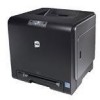Dell 1320c User Guide - Page 41
Envelopes, Labels - driver
 |
UPC - 662919013061
View all Dell 1320c manuals
Add to My Manuals
Save this manual to your list of manuals |
Page 41 highlights
l Paper should be punched at the paper manufacturer and not drilled into paper already packaged in a ream. Drilled paper can cause jams when multiple sheets feed through the printer. This may result in a paper jam. l Pre-punched paper can include more paper dust than standard paper. Your printer may require more frequent cleaning and feed reliability may not be as good as standard paper. l Weight guidelines for pre-punched paper are the same as non-punched paper. Envelopes Depending on the choice of envelopes, it is possible to expect variable levels of light wrinkling. Before buying large quantities of any print media, Dell recommends trying a sample first. See "Loading Print Media in Tray 1" or "Loading the Single Sheet Feeder" for instructions on loading an envelope. When printing on envelopes: l Use only high-quality envelopes that are designed for use in laser printers. l Set the print media source to the single sheet feeder or Tray 1. Set the paper type to Envelope, and select the correct size of envelope from the printer driver. l For best performance, use envelopes made from 75 g/m2 (20 lb bond) paper. You can use up to 105 g/m2 (28 lb bond) weight for the envelope feeder as long as the cotton content is 25% or less. Envelopes with 100% cotton content must not exceed 90 g/m2 (24 lb bond) weight. l Use only new, undamaged envelopes. l Use envelopes that can withstand temperatures of 205°C (401°F) without sealing, excessive curling, wrinkling, or releasing hazardous emissions. If you have any doubts about the envelopes you are considering, check with the envelope supplier. l Adjust the guide to fit the width of the envelopes. l To load envelope in the single sheet feeder, insert the envelopes with the flaps closed and the short-edge of the envelopes facing into the printer. The print side must be facing down. l See "Loading Print Media in Tray 1" or "Loading the Single Sheet Feeder" for instructions on loading an envelope. l Use one envelope size during a print job. l Ensure the humidity is low because high humidity (more than 60%) and the high printing temperatures may seal the envelopes. l For best performance, do not use envelopes that: ¡ Have excessive curl or twist ¡ Are stuck together or damaged in any way ¡ Contain windows, holes, perforations, cutouts, embossing ¡ Use metal clasps, string ties, or metal folding bars ¡ Have an interlocking design ¡ Have postage stamps attached ¡ Have any exposed adhesive when the flap is in the sealed or closed position ¡ Have nicked edges or bent corners ¡ Have rough, cockle, or laid finishes Labels Your printer can print on many labels designed for use with laser printers. Dell recommends feeding Labels from Tray 1. Label adhesives, face sheet (printable stock), and topcoats must be able to withstand temperatures of 205°C (401°F) and pressure of 25 pounds per square inch (psi). Before buying large quantities of any print media, Dell recommends trying a sample first. When printing on labels:















